Disciple: A Safe and Dignified Home for All God’s Children
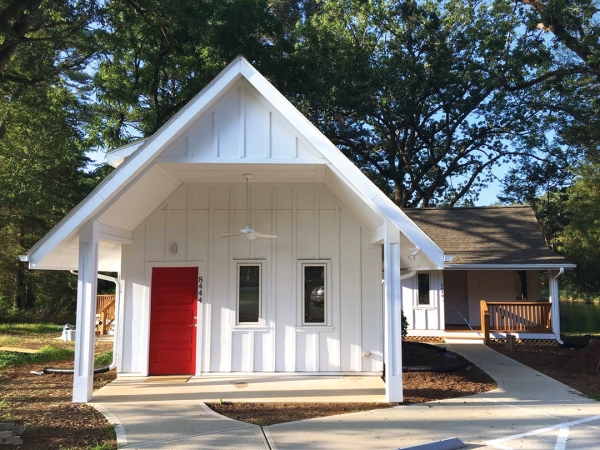
Bishop’s Committee on Affordable Housing engages in direct service and advocacy
During the 204th Annual Convention in November 2019, the Diocese of North Carolina passed a resolution establishing the Bishop’s Committee on Affordable Housing “to support missions and parishes in following the Biblical call to become Beloved Community, which includes taking action to ensure that all of God’s children have good, safe, and dignified places to live and thrive.” To accomplish their goals, the committee has recruited a powerful team of volunteers (see sidebar) with expertise in a variety of housing program models. While members support and lead affordable housing ministries in their own communities, they also advocate for state and local policies to reduce the need for direct services by passing legislation to create and protect safe, affordable housing options for everyone. Their efforts have grown only more necessary since the advent of the COVID-19 pandemic and the resultant economic downturn.
According to the National Low Income Housing Coalition, to afford a modest, two-bedroom rental home in North Carolina, someone would need either to earn the two-bedroom housing wage of at least $17.67 per hour or to work 97 hours per week at the current minimum wage of $7.25 per hour. That is not a typo; for a minimum wage-earning employee—a single parent with children, for example—to afford a modest two-bedroom rental in North Carolina, that person would need to work 97 hours per week, more than double the customary 40-hour work week, to afford a safe place to live. Further, this scenario assumes the rental unit is listed at fair market rent, or $919 per month for a two-bedroom apartment or single-family home. Anyone who has shopped for a rental in one of North Carolina’s metro areas during the past few years recognizes how difficult it is to find such a unit.
There is, of course, regional variation throughout the state. In the Winston-Salem metro area, where Convention was gathered when it passed the 2019 affordable housing resolution, the housing wage for a two-bedroom home is $14.67 per hour; in Raleigh, where Diocesan House is located, that housing wage is $22.37. While the more rural parts of the state—Halifax County, for example—have lower rents, the two-bedroom housing wage is still almost double the minimum wage: $13.85 per hour.
These statistics, harrowing though they are, assume steady, full- or more-than-full-time employment. For the 6.1% of North Carolinians who are unemployed—or, put another way, the 37,000 people in the Raleigh area, the 19,000 people in Winston-Salem and the 2,403 people in Halifax County who, as of this writing, are unemployed—finding affordable housing is an even more daunting task.1
The Bishop’s Committee on Affordable Housing seeks to address the affordable housing crisis with an awareness of our diocesan journey toward Becoming Beloved Community, especially the diocesan priorities of racial equity and creation care. As the committee describes in the forthcoming publication, “Becoming Beloved Community: Good Homes for All God’s Children: A Guidebook for Housing Ministries in the Diocese of North Carolina,” “[r]edlining laws restricted lending in African American neighborhoods, covenants prohibited sales to people of color, ‘blight’ removal smashed proud communities, industrial contamination and ‘dumps’ created environmental hazards, predatory lending strips equity, gaps between housing costs and income result in evictions, deteriorating conditions are health risks.” On the environmental front, new subdivisions destroy natural habitats, and suburbs placed far from commercial centers increase emissions from long daily commutes.
Another of our diocesan priorities—collaboration—offers a means of increasing the supply of affordable housing through partnerships with neighborhood associations and homeowners, other churches and nonprofits, local governments, health systems and schools. Members of the committee are already modeling collaboration both within the committee and in their own communities.
“It’s really exciting. We’ve got tremendous energy and expertise, and it’s just really, really gratifying to see how the members are inspiring each other, and advising each other, and learning from each other,” the Rev. Beth McKee-Huger, co-chair of the committee, said. “We want to take that same learning and inspiration to the broader Church now that we’ve got a strong start with the members of the committee.”
One major initiative of the committee is the afore-mentioned handbook, which includes inspiring examples, concrete guidance and contact people for launching or supporting a variety of affordable housing ministries, as well as suggestions for advocacy. The guidebook is dedicated to late committee member and passionate advocate for justice in housing Angie Forde of St. Martin’s, Charlotte. It will become available on the diocesan website later in the spring, but, for those ready to engage in affordable housing ministry now, read on for stories of direct service and advocacy.
CREATING AFFORDABLE HOUSING
One of the most obvious ways to increase affordable housing opportunities in a community is to build more affordable housing. (This assumes, of course, that local policies allow for affordable housing, but more on that later.) Several churches in the Diocese have taken on this challenge.
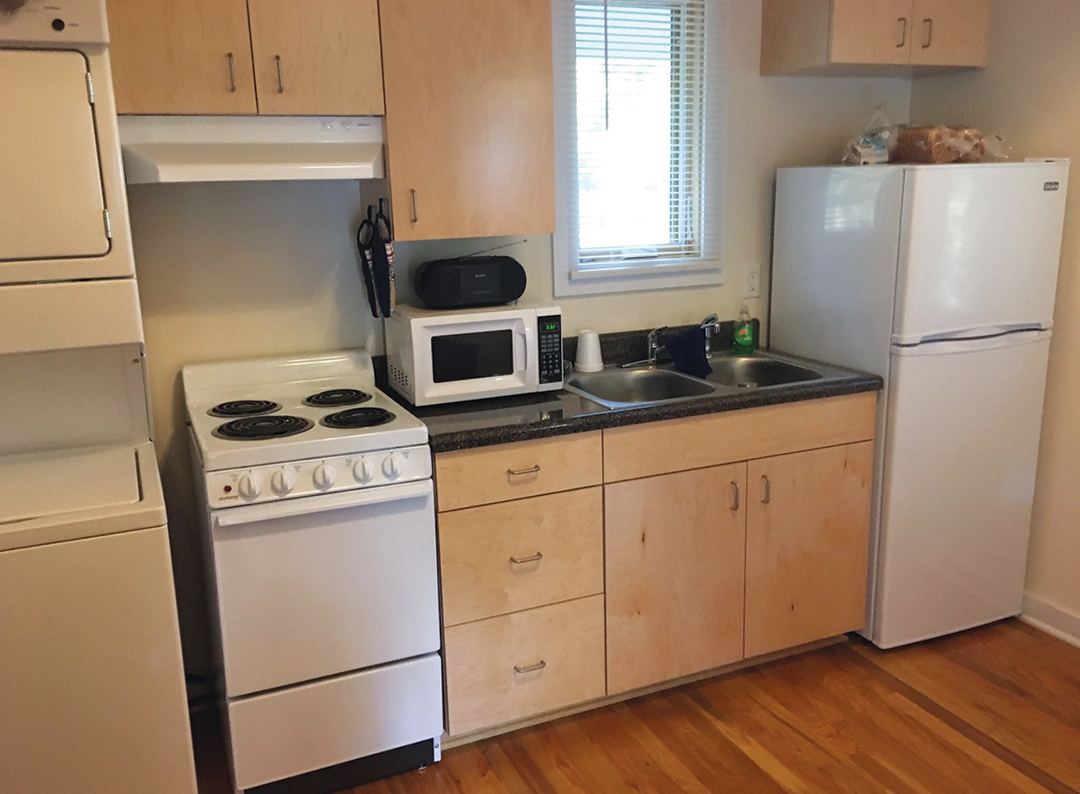 The people of Church of the Advocate, Chapel Hill, literally invited neighbors to live on the church’s 15-acre property through a collaboration with PeeWee Homes Inc., which builds tiny homes (less than 360 square feet in area) and rents them to people with a history of homelessness. To help tenants build equity, rent is set on a sliding scale not to exceed one-third of tenants’ monthly income. The rent averages $200-$250 per month, which pays for a building manager, maintenance and upkeep, and a portion of each monthly payment is held in escrow for the renter as an emergency fund or to help them transition to their next home.
The people of Church of the Advocate, Chapel Hill, literally invited neighbors to live on the church’s 15-acre property through a collaboration with PeeWee Homes Inc., which builds tiny homes (less than 360 square feet in area) and rents them to people with a history of homelessness. To help tenants build equity, rent is set on a sliding scale not to exceed one-third of tenants’ monthly income. The rent averages $200-$250 per month, which pays for a building manager, maintenance and upkeep, and a portion of each monthly payment is held in escrow for the renter as an emergency fund or to help them transition to their next home.
[Image: The petite exterior of a 360-square foot PeeWee Home (above) hides a surprisingly roomy interior, as demonstrated by the kitchen (right). Photos by the Rev. Lisa Fischbeck.]
“The Advocate neither spends nor received money on the project,” the Rev. Lisa Fischbeck, vicar of the Advocate, said. “The goal is sustainability.”
While another church interested in partnering with PeeWee Homes or a similar organization might opt to fund construction with a loan, the Advocate opted to raise the funds up front through a variety of sources, including the Town of Chapel Hill, a class from the Kenan Flagler Business at the University of North Carolina-Chapel Hill, a $10,000 Mission Endowment Grant, foundations and individual donors.
In addition to building three tiny homes and leasing the buildings and land beneath them to PeeWee Homes, the people of the Advocate provide neighbors and friendship to the tenants. And the cluster of PeeWee homes is a true neighborhood, where residents fish the pond stocked with bass, brim and catfish or enjoy the vegetable garden and more than 1,000 native grasses and wildflowers planted around the pond and throughout five acres as part of the Piedmont Patch Project to transform the Advocate’s land into a food-producing natural habitat.
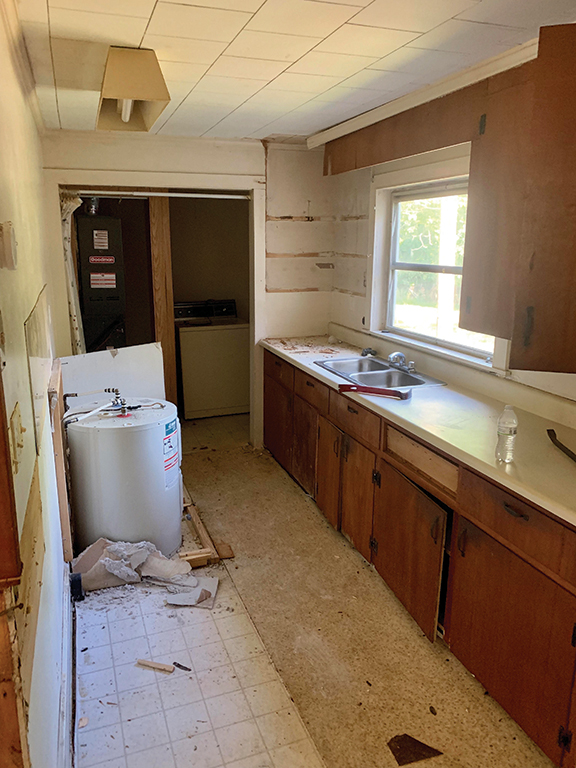 In Anson County, Calvary, Wadesboro, and other churches created Anson County Homes of Hope, an offshoot of Stanly County Homes of Hope, because so many applicants to the latter program lived in Anson County. Led by board president and member of Calvary Chipper Long, the group incorporated with the state of North Carolina in March 2018 and has since purchased and refurbished a duplex. They are now converting a second building into three units. Anson County Homes of Hope takes a flexible approach to providing affordable housing solutions, offering transitional housing in addition to short- and long-term affordable housing, depending on a tenant’s needs.
In Anson County, Calvary, Wadesboro, and other churches created Anson County Homes of Hope, an offshoot of Stanly County Homes of Hope, because so many applicants to the latter program lived in Anson County. Led by board president and member of Calvary Chipper Long, the group incorporated with the state of North Carolina in March 2018 and has since purchased and refurbished a duplex. They are now converting a second building into three units. Anson County Homes of Hope takes a flexible approach to providing affordable housing solutions, offering transitional housing in addition to short- and long-term affordable housing, depending on a tenant’s needs.
The transitional housing program, for example, serves residents for six months, with rent and utilities covered in full for the first three months. During the last three months of their stay, residents pay $50, $75 and $100, respectively, in rent. During that six-month stay, Homes of Hope also matches up to $500 in a resident’s savings. Importantly, everyone Homes of Hope serves, whether through emergency shelter, transitional housing or affordable housing, meets regularly with a case manager who provides additional support in attaining and remaining in affordable housing.
“We’ve created a home with dignity and pride which will hopefully translate into hope for people who live there,” Long said.
 Like PeeWee Homes, Anson County Homes of Hope is a collaboration among Episcopal, governmental and private groups. The project has received two diocesan Mission Endowment Grants: $25,000 during the fall 2017 cycle to purchase the original duplex and a second grant during the fall 2020 cycle to renovate the triplex. Other community partners include the Sandhills Community Action Project (SCAB), Stanly County Homes of Hope, Sandhills Community Housing Project, the North Carolina Housing Finance Agency, Braswell Trust and Calvary, which applied for the Mission Endowment grants and provides free office space in the former domestic violence shelter occupying the lower level of the church.
Like PeeWee Homes, Anson County Homes of Hope is a collaboration among Episcopal, governmental and private groups. The project has received two diocesan Mission Endowment Grants: $25,000 during the fall 2017 cycle to purchase the original duplex and a second grant during the fall 2020 cycle to renovate the triplex. Other community partners include the Sandhills Community Action Project (SCAB), Stanly County Homes of Hope, Sandhills Community Housing Project, the North Carolina Housing Finance Agency, Braswell Trust and Calvary, which applied for the Mission Endowment grants and provides free office space in the former domestic violence shelter occupying the lower level of the church.
[Image: The before (above) and after (right) of a kitchen refurbishment in the Anson County Homes of Hope duplex. Photos by Chipper Long]
While the Advocate and Calvary have increased affordable housing options in their respective communities through creative partnerships and novel housing models, many churches throughout the Diocese have long-standing partnerships with local Habitat for Humanity affiliates. The barrier to entry on these projects is low, as Habitat for Humanity provides a proven model, construction expertise and vetting for prospective homeowners. Congregations and other organizations help fund the cost of construction and provide volunteers to build homes alongside the homeowners (and under professional supervision). Volunteers as young as 16 are welcome on construction sites, making Habitat for Humanity an appealing option for youth groups as well as adult volunteers. Those who are not comfortable with a hammer and nails can instead raise funds or provide meals for builders.
Because building a home is a major undertaking, Habitat for Humanity builds typically require partnerships among churches and community groups. In 2015, the Diocese and St. Luke’s, Durham, led the entire Durham Convocation, interfaith partners and local universities in constructing the Bishop Johnson Hospitality House a Durham Habitat Build to honor the memory of the Rt. Rev. Robert Johnson. Diocesan churches in other cities and convocations have engaged in similar partnerships throughout the years, building hundreds of affordable homes for lower-income homeowners throughout the Diocese.
KEEPING LONG-TIME RESIDENTS HOME
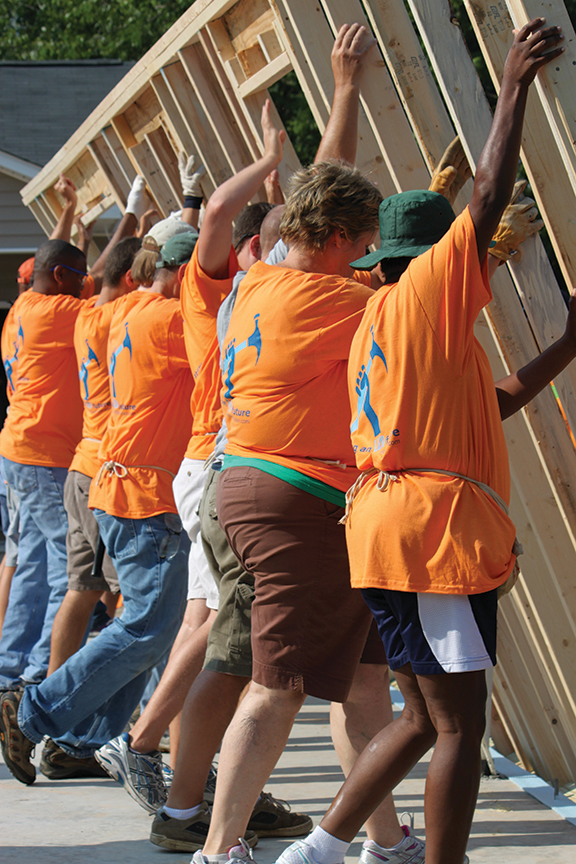 In the historically Black Optimist Park neighborhood of Charlotte, where rapid gentrification has spiked property values during the last decade, property taxes have more than tripled since many homeowners bought their homes. The result is many long-time homeowners being priced out of the community. The Chapel of Christ the King, Charlotte, is preserving homeownership for owners of Habitat for Humanity homes in the neighborhood. The church’s Optimist Park Emergency Tax Relief Fund, steered by a committee composed of two members of the Chapel, the president of the Optimist Park Community Association and the fund’s main fundraiser, covers a portion of property taxes for homeowners who cannot absorb the increase on their own. In its first year, the fund assisted 11 homeowners with their tax payments. The contributions are paid directly to the taxing authority, while homeowners receive education concerning how to negotiate if they are pressured to sell their property for redevelopment. Chapel of Christ the King offered one such training in February 2020 and plans to offer more in the future, along with Habitat for Humanity’s financial literacy training.
In the historically Black Optimist Park neighborhood of Charlotte, where rapid gentrification has spiked property values during the last decade, property taxes have more than tripled since many homeowners bought their homes. The result is many long-time homeowners being priced out of the community. The Chapel of Christ the King, Charlotte, is preserving homeownership for owners of Habitat for Humanity homes in the neighborhood. The church’s Optimist Park Emergency Tax Relief Fund, steered by a committee composed of two members of the Chapel, the president of the Optimist Park Community Association and the fund’s main fundraiser, covers a portion of property taxes for homeowners who cannot absorb the increase on their own. In its first year, the fund assisted 11 homeowners with their tax payments. The contributions are paid directly to the taxing authority, while homeowners receive education concerning how to negotiate if they are pressured to sell their property for redevelopment. Chapel of Christ the King offered one such training in February 2020 and plans to offer more in the future, along with Habitat for Humanity’s financial literacy training.
[Image: A Habitat for Humanity wall raising. Archival photo]
“There’s nothing like being able to call a homeowner who didn’t know how in the world she was going to be able to pay her tax bill, and letting her know her application was approved, and being told that you just MADE her Christmas,“ the Rev. Rebecca Yarbrough, deacon at Chapel of Christ the King, said.
The church is aware the Tax Relief Fund, while significant, is only a temporary fix. To address the underlying need will require tax changes to provide greater relief to long-time residents of neighborhoods that are gentrifying. Such changes require advocacy.
ADVOCATING FOR CHANGE
St. Barnabas, Holy Spirit and All Saints’, Greensboro, have pushed back against local efforts to block proposals for nearby affordable housing developments and deny zoning requests to allow multifamily residential. (Zoning laws that limit housing density are a round-about way of limiting affordable housing by decreasing the efficiency of land use.) To address these housing inequities, the people of St. Barnabas discussed racial barriers to housing during adult formation. As a result, member Christine Merriman advocated for the housing proposal in her neighborhood association meeting, the zoning commission and city council. The people of Holy Spirit saw a zoning notice sign next to the church and welcomed the affordable housing developer to the community. Members of All Saints and nearby Methodist, Presbyterian and Lutheran churches are planning ways to welcome new neighbors once a third proposed affordable housing development is completed, thus normalizing affordable housing in the neighborhood.
Welcoming residents of affordable housing is critical, especially when a community is hostile to affordable housing developments.
BEING GOOD NEIGHBORS
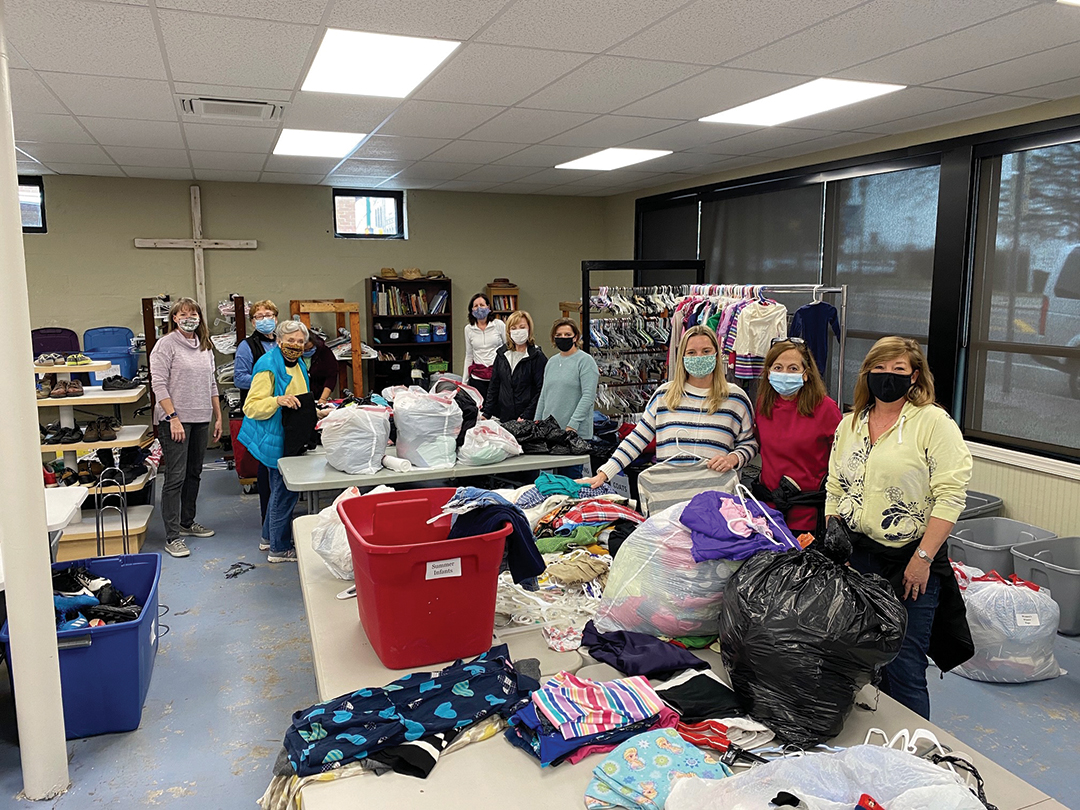 St. Margaret’s, Waxhaw recently started a fund to buy beds for clients who are moving out of the Community Shelter of Union County and into permanent housing. As of the end of February, the church collected $1,400 and, through a wholesale contact, purchased seven full-size bed sets. With the six mattresses previously purchased through outreach funds, the church has provided an essential piece of furniture to 13 people re-establishing themselves in permanent housing. This work is made possible due to a parishioner who connected Traci Scott, assistant to the rector for outreach and parish connection, to a wholesaler, with whom they were able to negotiate a discounted price on mattresses purchased as part of the program.
St. Margaret’s, Waxhaw recently started a fund to buy beds for clients who are moving out of the Community Shelter of Union County and into permanent housing. As of the end of February, the church collected $1,400 and, through a wholesale contact, purchased seven full-size bed sets. With the six mattresses previously purchased through outreach funds, the church has provided an essential piece of furniture to 13 people re-establishing themselves in permanent housing. This work is made possible due to a parishioner who connected Traci Scott, assistant to the rector for outreach and parish connection, to a wholesaler, with whom they were able to negotiate a discounted price on mattresses purchased as part of the program.
[Image: Members of St. Margaret’s, Waxhaw, sort clothing at the Community Shelter of Union County. The church’s relationship with the shelter led to the creation of their new mattress ministry. Photo courtesy of St. Margaret’s, Waxhaw]
“When we join together, we are able to do great things in our community,” Scott said.
At St. Michael’s, Raleigh, Family Support Circles help families access an array of services to help them become self-sufficient. In partnership with Catholic Charities, a team of 8-12 parishioners works directly with a family for one year as they work toward permanent housing, access to a rental voucher, if necessary, and employment. The church provides one-third of the rent, plus encouragement and relationships.
The ministries highlighted in these pages represent only a fraction of the ways churches engage around the housing crisis in their communities. From church-based emergency shelter programs to rent assistance, food and clothing drives to formation programs about the ongoing effects of systemic racism across sectors, churches address both the causes and effects of the affordable housing crisis.
The Bishop’s Committee on Affordable Housing sums up the biblical call of this work as follows:
Despite the enormity of the challenge, the affordable housing crisis gives churches the opportunity to improve lives in real and tangible ways.
Summerlee Walter is the communications coordinator for the Episcopal Diocese of North Carolina.
GETTING STARTED
If you’re interested in getting started with one of the ministry models described on these pages, the Bishop’s Committee on Affordable Housing has identified ways to learn more:
- PeeWee Homes: Contact the Rev. Lisa Fischbeck, or learn more at peeweehomes.org.
- Homes of Hope: Contact Chipper Long.
- Habitat for Humanity: Contact Blake Strayhorn, or find your local affiliate at habitat.org/volunteer/near-you/find-your-local-habitat.
- Property Tax Relief: Contact the Rev. Reggie Payne-Wiens at or the Rev. Rebecca Yarbrough.
- Advocacy: Contact the Rev. Beth McKee-Huger.
- Mattress Ministry: Contact Traci Scott.
- Circles of Support: Contact Sharon Mitchell.
AREAS FOR ADVOCACY
You can find contact information for your state senator or house member at ncleg.net.
Local Zoning Issues and Strategic Housing Plans: Land is a substantial challenge for development, and it is increasingly difficult to find land that is affordable, suitable for development and located near employment, schools and medical care. Local zoning ordinances requiring larger lots per home or limiting multifamily construction curtail the possibility of affordable housing.
Learn more about advocating for progressive land use policies through the “Cost of Home” platform at habitat.org.
Predatory Lending: People with limited income or living in areas with a history of disinvestment face barriers to standard financing for mortgages, home equity loans or other lending. Borrowers may be offered loans with high interest rates, hidden fees or deceptive features. Subprime mortgages strip equity from homeowners who find they owe more than the property is worth.
Learn more about advocating for responsible lending at responsiblelending.org.
Fair Housing, Segregation and Gentrification: Racial segregation and deteriorating housing conditions are some of the legacies of redlining. Foreclosed homes from subprime lending can create lower property values, which attract investors who flip homes so that they are no longer affordable or who rent the homes “as is.”
Learn more about fair housing issues at fairhousingnc.org.
To research additional federal or state housing issues, visit:
- National Low Income Housing Coalition
- North Carolina Housing Coalition
- Habitat for Humanity
- NC Coalition to End Homelessness
MEET THE COMMITTEE
- The Rev. Beth McKee-Huger, co-chair, regional deacon
- Mary Reca Todd, co-chair, St. Michael’s Raleigh
- Fritz Healy, Emmanuel, Southern Pines
- Stephen (Chipper) Long, Calvary, Wadesboro
- Blake Strayhorn, Christ Church, Raleigh; director of housing impact at Reinvestment Partners and former executive director of Habitat for Humanity of Durham
- Allison Kratt, St. John’s, Charlotte
- Bill Dowse, Durham; retired from the North Carolina Housing Finance Agency
- Pamela Haynes, Trinity, Statesville
- Robert Kucab, Raleigh; retired executive director of the North Carolina Housing Finance Agency
- The Rev. Rebecca Yarbrough, Chapel of Christ the King, Charlotte
- Al Benshoff, All Saints’, Concord
- Pat Patterson, St. Patrick’s, Mooresville; apartment property manager
- Andy Scott, Holy Trinity, Greensboro
- The Rev. Dr. Michael Bell, Presiding Elder, Wilson District, AME Zion Church
- The Rev. Emily Parker, Christ Church, Charlotte
- Mav Hankey, Southern Pines
- The late Angie Forde, St. Martin’s, Charlotte, to whom the new handbook is dedicated
